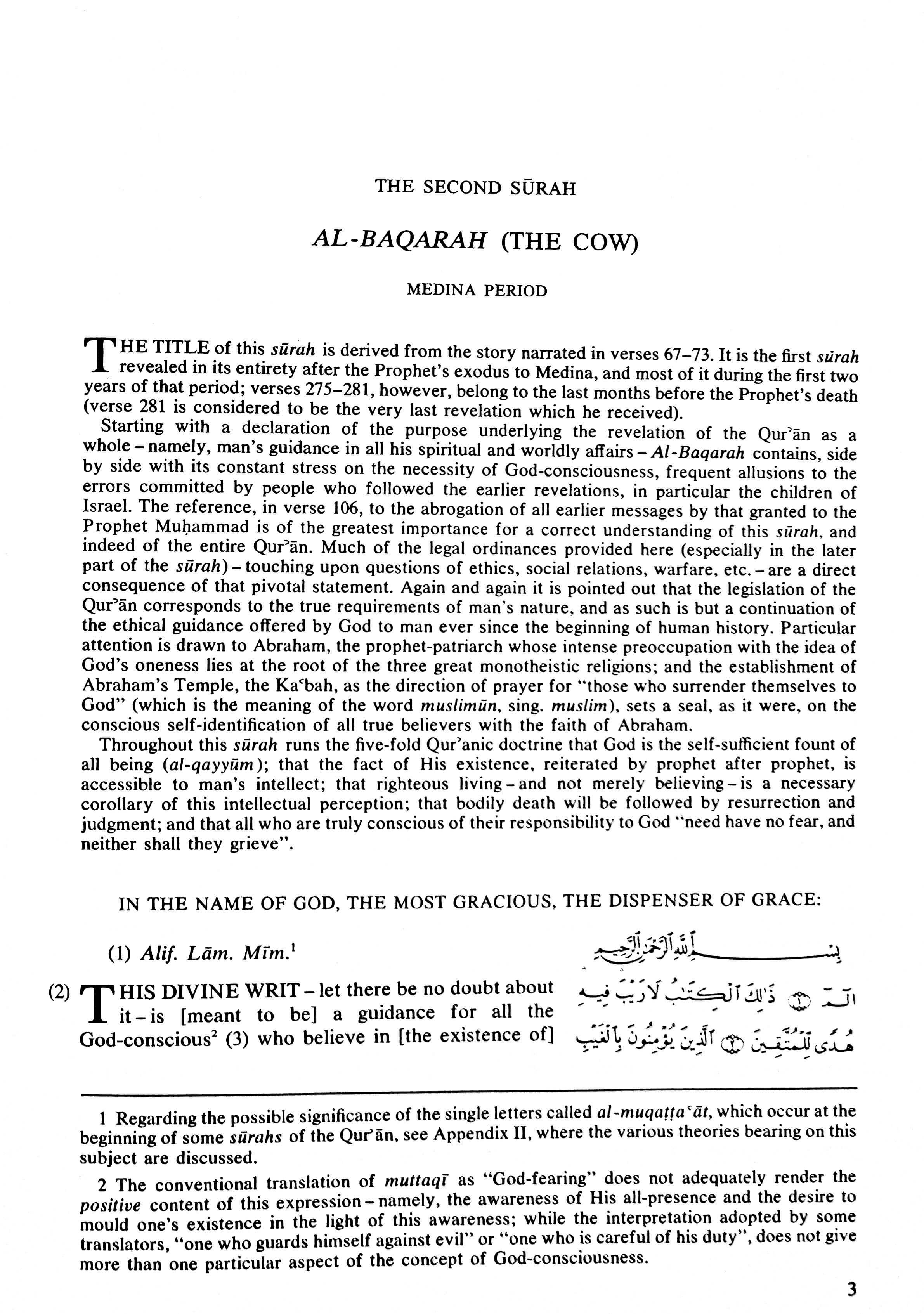Muhammad Asad, The Message of the Qur’ān; Translated and Explained by Muhammad Asad (1980)
Al-Baqarah (The Cow)
The title of this sūrah is derived from the story narrated in verses 67–73. It is the first sūrah revealed in its entirety after the Prophet’s exodus to Medina, and most of it during the first two years of that period; verses 275–281, however, belong to the last months before the Prophet’s death (verse 281 is considered to be the very last revelation which he received).
Starting with a declaration of the purpose underlying the revelation of the Qurʾān as a whole – namely, man’s guidance in all his spiritual and worldly affairs – Al-Baqarah contains, side by side with its constant stress on the necessity of God-consciousness, frequent allusions to the errors committed by people who followed the earlier revelations, in particular the children of Israel. The reference, in verse 106, to the abrogation of all earlier messages by that granted to the Prophet Muḥammad is of the greatest importance for a correct understanding of this sūrah, and indeed of the entire Qurʾān. Much of the legal ordinances provided here (especially in the later part of the sūrah) – touching upon questions of ethics, social relations, warfare, etc. – are a direct consequence of that pivotal statement. Again and again it is pointed out that the legislation of the Qurʾān corresponds to the true requirements of man’s nature, and as such is but a continuation of the ethical guidance offered by God to man ever since the beginning of human history. Particular attention is drawn to Abraham, the prophet-patriarch whose intense preoccupation with the idea of God’s oneness lies at the root of the three great monotheistic religions; and the establishment of Abraham’s Temple, the Kaʿbah, as the direction of prayer for “those who surrender themselves to God” (which is the meaning of the word muslimūn, sing, muslim). sets a seal, as it were, on the conscious self-identification of all true believers with the faith of Abraham.
Throughout this sūrah runs the five-fold Qurʾanic doctrine that God is the self-sufficient fount of all being (al-qayyūm); that the fact of His existence, reiterated by prophet after prophet, is accessible to man’s intellect; that righteous living – and not merely believing – is a necessary corollary of this intellectual perception; that bodily death will be followed by resurrection and judgment; and that all who are truly conscious of their responsibility to God "need have no fear, and neither shall they grieve”.
(1) Alif. Lām. Mīm.1
(2) This Divine Writ – let there be no doubt about it – is [meant to be] a guidance for all the God-conscious 2 (3) who believe in [the existence of]
1 Regarding the possible significance of the single letters called al-muqaṭṭaʿāt, which occur at the beginning of some sūrahs of the Qurʾān, see Appendix II, where the various theories bearing on this subject are discussed.
2 The conventional translation of muttaqī as “God-fearing” does not adequately render the positive content of this expression – namely, the awareness of His all-presence and the desue to mould one’s existence in the light of this awareness; while the interpretation adopted by some translators, “one who guards himself against evil” or “one who is careful of his duty”, does not give more than one particular aspect of the concept of God-consciousness.
